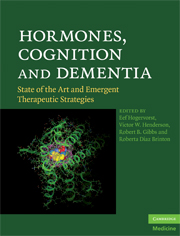Book contents
- Hormones, Cognition and Dementia
- Hormones, Cognition and Dementia
- Copyright page
- Contents
- Contributors
- Preface
- Section 1 Estrogens and cognition: perspectives and opportunities in the wake of the Women's Health Initiative Memory Study
- Chapter 1 Women's Health Initiative Memory Study (WHIMS) program: emerging findings
- Chapter 2 Identifying risk factors for cognitive change in the Women's Health Initiative: a neural networks approach
- Chapter 3 Estrogen therapy – relationship to longevity and prevalent dementia in the oldest-old: the Leisure World Cohort Study and the 90+ Study
- Chapter 4 The critical window hypothesis: hormone exposures and cognitive outcomes after menopause
- Chapter 5 Animal studies that support estrogen effects on cognitive performance and the cholinergic basis of the critical period hypothesis
- Chapter 6 The healthy cell bias of estrogen action through regulating glucose metabolism and mitochondrial function: implications for prevention of Alzheimer's disease
- Section 2 Varieties of estrogenic therapy
- Section 3 Potential modulators and modifiers of estrogenic effects
- Section 4 Possible genetic factors related to hormone treatment effects
- Section 5 Testosterone, estradiol and men, and sex hormone binding globulin
- Section 6 Gonadotropin effects
- Index
- Plate Section
Chapter 4 - The critical window hypothesis: hormone exposures and cognitive outcomes after menopause
from Section 1 - Estrogens and cognition: perspectives and opportunities in the wake of the Women's Health Initiative Memory Study
Published online by Cambridge University Press: 06 July 2010
- Hormones, Cognition and Dementia
- Hormones, Cognition and Dementia
- Copyright page
- Contents
- Contributors
- Preface
- Section 1 Estrogens and cognition: perspectives and opportunities in the wake of the Women's Health Initiative Memory Study
- Chapter 1 Women's Health Initiative Memory Study (WHIMS) program: emerging findings
- Chapter 2 Identifying risk factors for cognitive change in the Women's Health Initiative: a neural networks approach
- Chapter 3 Estrogen therapy – relationship to longevity and prevalent dementia in the oldest-old: the Leisure World Cohort Study and the 90+ Study
- Chapter 4 The critical window hypothesis: hormone exposures and cognitive outcomes after menopause
- Chapter 5 Animal studies that support estrogen effects on cognitive performance and the cholinergic basis of the critical period hypothesis
- Chapter 6 The healthy cell bias of estrogen action through regulating glucose metabolism and mitochondrial function: implications for prevention of Alzheimer's disease
- Section 2 Varieties of estrogenic therapy
- Section 3 Potential modulators and modifiers of estrogenic effects
- Section 4 Possible genetic factors related to hormone treatment effects
- Section 5 Testosterone, estradiol and men, and sex hormone binding globulin
- Section 6 Gonadotropin effects
- Index
- Plate Section
Summary
Critical windows are a common phenomenon in biological systems. An exposure or experience at one point in time may elicit a different response, or even no response, at another time. In this chapter, Henderson considers several versions of the so-called critical window hypothesis as it relates to a woman's estrogenic exposures during middle age or during a later period of her life. These versions are based on timing of exposure, type of cognitive outcome, and timing of cognitive outcome assessment. At present, long-term cognitive effects of estrogenic exposures around the time of natural menopause are essentially unknown. As Henderson points out, some important but controversial clinical issues will be extraordinarily difficult to resolve. Partial answers may come from the ongoing Early versus Late Intervention Trial and the Kronos Early Estrogen Prevention Study. Truly convincing evidence regarding the critical window hypothesis can come only from randomized controlled trials in midlife women with follow-up extending into old age. Surrogate biomarkers may make some trial designs more feasible, and animal models and well designed observational studies can continue to provide valuable data. In the future, a variety of selective estrogen receptor modulators alone or in combination with an estrogen are certain to come to market, and similar issues may arise as more women are exposed to these compounds.
- Type
- Chapter
- Information
- Hormones, Cognition and DementiaState of the Art and Emergent Therapeutic Strategies, pp. 32 - 44Publisher: Cambridge University PressPrint publication year: 2009



